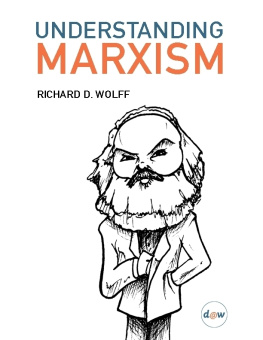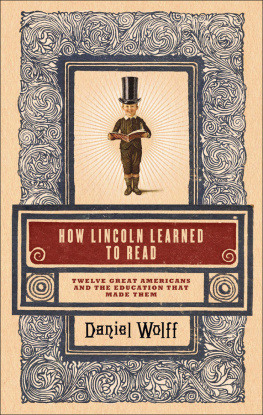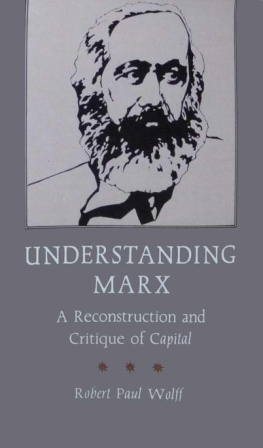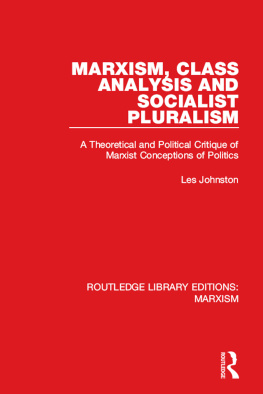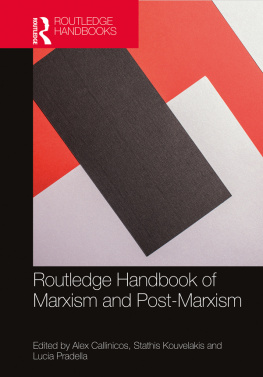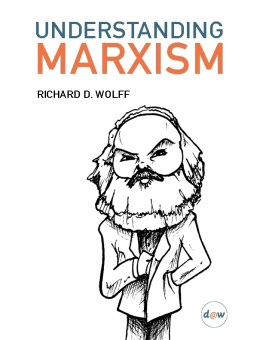Wolff - Understanding Marxism
Here you can read online Wolff - Understanding Marxism full text of the book (entire story) in english for free. Download pdf and epub, get meaning, cover and reviews about this ebook. year: 2019, publisher: Lulu.com, genre: Politics. Description of the work, (preface) as well as reviews are available. Best literature library LitArk.com created for fans of good reading and offers a wide selection of genres:
Romance novel
Science fiction
Adventure
Detective
Science
History
Home and family
Prose
Art
Politics
Computer
Non-fiction
Religion
Business
Children
Humor
Choose a favorite category and find really read worthwhile books. Enjoy immersion in the world of imagination, feel the emotions of the characters or learn something new for yourself, make an fascinating discovery.
Understanding Marxism: summary, description and annotation
We offer to read an annotation, description, summary or preface (depends on what the author of the book "Understanding Marxism" wrote himself). If you haven't found the necessary information about the book — write in the comments, we will try to find it.
Wolff: author's other books
Who wrote Understanding Marxism? Find out the surname, the name of the author of the book and a list of all author's works by series.
Understanding Marxism — read online for free the complete book (whole text) full work
Below is the text of the book, divided by pages. System saving the place of the last page read, allows you to conveniently read the book "Understanding Marxism" online for free, without having to search again every time where you left off. Put a bookmark, and you can go to the page where you finished reading at any time.
Font size:
Interval:
Bookmark:
Richard D. Wolff
Democracy at Work
2019
As in private life one differentiates between what a man thinks and says of himself and what he really is and does, so in historical struggles one must still more distinguish the language and the imaginary aspirations of parties from their real organism and their real interests, their conception of themselves from their reality. Karl Marx
In modern capitalism, the products of capitalist enterprises take the form of commodities. That means they pass from producer to consumer by means of an intermediate process, namely market exchanges. Capitalist enterprises buy their commodity inputs, hire (another word for buy) the labor power of their laborers, and sell the commodity outputs produced by combining inputs and laborers in work. A distinguishing sign of capitalism is that the ability to work labor power itself becomes a commodity to be bought and sold. Labor power was not a commodity in the slave and feudal economic systems.
Capitalist businesses obtain revenues, money earned by selling their output commodities. Their revenues typically exceed the sum of money spent buying input commodities (the tools, equipment and raw materials used up in production) plus money spent buying labor power. In short, revenues exceed costs of production. That excess is the surplus.
One implication of Marxs analysis is that the class of employers will always seek to reduce the wages paid to their hired, productive laborers. Likewise, employers will always seek to lengthen the time and pace of work.
The reasons for both pressures lie in the simple arithmetic of capitalist exploitation: the greater the value added by the laborers and the smaller the portion returned to them as wages, the greater the surplus acquired by the capitalist.
As we discuss further below, the more surplus the capitalist can get from the surplus-producing laborers, the more funds the capitalist has to consume, grow, compete and secure the system that puts the capitalist on top. Productive laborers will likewise always seek higher wages as their standard of living (and that of their family) usually depends on those wages.
Class struggle is the unavoidable result of capitalism.
Over the last three centuries, capitalism has successfully reproduced itself while spreading to become the dominant organization of production in the world. However, as Marx pointed out, capitalisms operations and reproduction were as efficient in producing wealth as in producing poverty. Poverty has proved to be a continuing problem for capitalism that it never eradicated.
For Marx, to eradicate poverty you need to change to an economic system other than capitalism.
I want to thank my colleagues in Democracy at Work who helped produce this pamphlet: Betsy Avila and Liz Phillips who directed this project from start to finish, Maria Carnemolla who contributed important advice and corrections along the way, Luis de la Cruz whose illustrations grace the cover, and Jake Keyel and Andrea Iannone for final copy editing. Countless conversations among us all produced this essay as indeed those conversations comprise all of Democracy at Work, a cooperative non-profit project.
Brexit, Trump, and the global anti-immigrant, anti-foreigner, right-wing wave show just how deeply troubled capitalism is after the 2008 crash. They replicate what happened in many places after capitalisms 1929 crash. Millions are frightened by economic decline. Neither education nor media nor engagement with critical political movements had prepared them for another crash and the subsequent lost decade that lingers. So many strike out in rage and desperation for change that might somehow help reverse the threatening downward spiral.
Given the previous half-century of Cold War and its effects on politics, culture and ideology, it was hardly surprising that major early surges of political protest took right-wing forms. Millions turned against political establishments that presided over the economic forces that led to the crash, then bailed out those who caused it and imposed harsh austerities on all those victimized by it. Voting socialist mostly failed as major socialist parties had accommodated to the dominant neoliberalism.
Now some grasp the error they made even as others reproduce it. Those frustrated with the capitalist system search for and find better answers than merely ousting political establishments. Wanting deeper, more critical analyses of what went so badly wrong in contemporary society and political economy, they dare ask... about system change.
Thus they find their way to the critique of capitalism stemming from the Marxian tradition, and discover all that it has to offer. All that was kept from political, academic, and mediatic discourses for so long.
There are rising demands for accessible introductions to Marxism and to the social changes it suggests. This essay responds to that interest. It seeks to provide bases for real solutions now that the flaws and failures of contemporary capitalism are exposed: goods delivered chiefly to the 1%, the rest mocked with outrageous inequality, instability, and grossly reactionary political leaders.
Marxism always was the critical shadow of capitalism. Their interactions changed them both. Now Marxism is once again stepping into the light as capitalism shakes from its own excesses and confronts decline. Hopefully this essay can help our era's renewal of Marxism.
The history of all hitherto existing society is the history of class struggles.
Marx, K., & Engels, F. (1966). Manifesto of the Communist Party. Moscow: Progress Publishers.
The mode of production of material life determines the social, political and intellectual life process in general.
Marx, K. (1970). A contribution to the critique of political economy. Moscow: Progress Publishers.
The human being is in the most literal sense a political animal, not merely a gregarious animal, but an animal which can individuate itself only in the midst of society.
Marx, K., & Nicolaus, M. (1973). Grundrisse : Foundations of the critique of political economy. New York: Vintage Books.
As in private life one differentiates between what a man thinks and says of himself and what he really is and does, so in historical struggles one must still more distinguish the language and the imaginary aspirations of parties from their real organism and their real interests, their conception of themselves from their reality.
Marx, K., & De, L. D. (1898). The eighteenth Brumaire of Louis Bonaparte. New York: International Pub. Co.
As capitalist, he is only capital personified. His soul is the soul of capital. But capital has one single life impulse, the tendency to create value and surplus-value, to make its constant factor, the means of production, absorb the greatest possible amount of surplus- labour .
Marx, Karl, 1818-1883. (1959). Das Kapital , a critique of political economy. Chicago : H. Regnery,
Hegel remarks somewhere that all great world-historic facts and personages appear, so to speak, twice. He forgot to add: the first time as a tragedy, the second time as a farce.
Marx, K., & De, L. D. (1898). The eighteenth Brumaire of Louis Bonaparte. New York: International Pub. Co.
The philosophers have only interpreted the world, in various ways. The point, however, is to change it.
Karl Marx, 'Theses on Feuerback ', in Marx, K. (1975). Karl Marx and Fredrick Engels. Selected Works. Moscow: Progress Publishers.
The proletarians have nothing to lose but their chains. They have a world to win. Working Men of All Countries, Unite!
Marx, K., & Engels, F. (1966). Manifesto of the Communist Party. Moscow: Progress Publishers.
Font size:
Interval:
Bookmark:
Similar books «Understanding Marxism»
Look at similar books to Understanding Marxism. We have selected literature similar in name and meaning in the hope of providing readers with more options to find new, interesting, not yet read works.
Discussion, reviews of the book Understanding Marxism and just readers' own opinions. Leave your comments, write what you think about the work, its meaning or the main characters. Specify what exactly you liked and what you didn't like, and why you think so.

